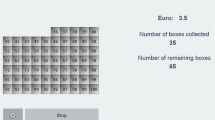Abstract
In the absence of an objective contingency, psychological studies have shown that people nevertheless attribute outcomes to their own actions. Thus, by wrongly inferring control in chance situations people appear to hold false beliefs concerning their agency, and are said to succumb to an illusion of control (IoC). In the current article, we challenge traditional conceptualizations of the illusion by examining the thesis that the IoC reflects rational and adaptive decision making. Firstly, we propose that the IoC is a by-product of a rational uncertain judgment (“the likelihood that I have control over a particular outcome”). We adopt a Bayesian perspective to demonstrate that, given their past experience, people should be prone to ascribing skill to chance outcomes in certain situations where objectively control does not exist. Moreover, existing empirical evidence from the IoC literature is shown to support such an account. Secondly, from a decision-theoretic perspective, in many consequential situations, underestimating the chance of controlling a situation carries more costs than overestimating that chance. Thus, situations will arise in which people will incorrectly assign control to events in which outcomes result from chance, but the attribution is based on rational processes.
Similar content being viewed by others
References
Alloy L., Abramson L. (1979) Judgment of contingency in depressed and nondepressed students: Sadder but wiser? Journal of Experimental Psychology 108: 441–485
Alloy L., Abramson L. (1982) Learned helplessness, depression, and the illusion of control. Journal of Personality and Social Psychology 42: 1114–1126
Biner P., Johnson B., Summers A., Chudzynski E. (2009) Illusory control as a function of the motivation to avoid randomly determined aversive outcomes. Motivation and Emotion 33: 32–41
Blanco F., Matute H., Vadillo M. (2011) Making the uncontrollable seem controllable: The role of action in the illusion of control. The Quarterly Journal of Experimental Psychology 64: 1290–1304
Burger J. (1986) Desire for control and the illusion of control: The effects of familiarity and sequence of outcomes. Journal of Research in Personality 20: 66–76
Burger J., Cooper H. (1979) The desirability of control. Motivation and Emotion 3: 381–393
Burger J., Hemans F. (1988) Desire for control and the attribution process. Journal of Personality 56: 531–546
Chater N., Oaksford M., Hahn U., Heit E. (2010) Bayesian models of cognition. WIREs Cognitive Science 1: 811–823
Chater N., Tenenbaum J. B., Yuille A. (2006) Probabilistic models of cognition: Conceptual foundations. Trends in Cognitive Sciences 10: 287–291
Ericsson K.A., Lehmann A. C. (1996) Expert and exceptional performance: Evidence of maximal adaptation to task constraints. Annual Review of Psychology 47: 273–305
Griffiths T. L., Chater N., Kemp C., Perfors A., Tenenbaum J. B. (2010) Probabilistic models of cognition: Exploring representations and inductive biases. Trends in Cognitive Sciences 14: 357–364
Ladouceur R., Sevigny S. (2005) Structural characteristics of video lotteries: Effects of a stopping device on illusion of control and gambling persistence. Journal of Gambling Studies 21: 117–131
Langer E. (1975) The illusion of control. Journal of Personality and Social Psychology 32: 311–328
Langer E. J., Rodin J. (1976) The effects of choice and enhanced personal responsibility for the aged: A field experiment in an institutional setting. Journal of Personality and Social Psychology 34: 191–198
Langer E., Roth J. (1975) Heads I win, tails it’s chance: The illun f the sequence of outcomes in a purely chance task. Journal of Personality and Social Psychology 32: 951–955
Leotti L. A., Iyengar S. S., Ochsner K. N. (2010) Born to choose: The origins and value of the need for control. Trends in Cognitive Sciences 14: 457–463
Martinez F., Bonnefon J.-F., Hoskens J. (2009) Active involvement, not illusory control, increases risk taking in a gambling game. The Quarterly Journal of Experimental Psychology 62: 1063–1071
Matute H. (1996) Illusion of control: Detecting response-outcome independence in analytic but not in naturalistic conditions. Psychological Science 7: 289–293
Matute H., Vadillo M. A., Blanco F., Musca S. C. (2007) Either greedy or well-informed: The reward maximization—unbiased evaluation trade-off. In: Vosniadou S., Kayser D., Protopapas A. (eds) Proceedings of the European Cognitive Science Conference. Erlbaum, Hove, UK, pp 341–346
Matute H., Vadillo M. A., Vegas S., Blanco F. (2007) Illusion of control in internet users and college students. Cyberpsychology and Behavior 10: 176–181
McKay R. T., Dennett D. C. (2009) The evolution of misbelief. Behavioral and Brain Sciences 32: 493–561
Mirowsky J., Ross C. (1990) Control or defense? Depression and the sense of control over good and bad outcomes. Journal of Health and Social Behavior 31: 71–86
Scheibehenne B., Wilke A., Todd P. M. (2011) Expectations of clumpy resources influence predictions of sequential events. Evolution and Human Behavior 32: 326–333
Stadelhofen F., Aufrere L., Besson J., Rosser J. (2009) Somewhere between illusion of control and powerlessness: Trying to situate the pathological gambler’s locus of control. International Journal of Clinical and Health Psychology 9: 117–126
Thompson S., Armstrong W., Thomas C. (1998) Illusion of control, underestimations and accuracy: A control heuristic explanation. Psychological Bulletin 123: 143–161




